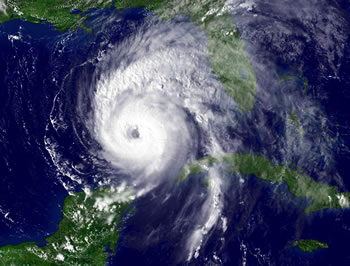Powerful hurricanes may be getting stronger due to warmer seas
Powerful hurricanes may be getting stronger due to warmer seas
mongabay.com
September 3, 2008
|
|
Warming climate is causing the strongest hurricanes to strengthen and more moderate storms to stay the same, claims a new study published in Nature. However the data on which research is based is already facing fierce criticism.
Analyzing satellite data from nearly 2,000 tropical cyclones around the world from 1981 to 2006, scientists from Florida State University and the University of Wisconsin-Madison found that wind speeds for the strongest hurricanes increased from an average of 140 mph in 1981 to 156 mph in 2006, while the average global sea-surface temperature in regions where tropical cyclones form increased from 82.8 degrees to 83.3 degrees.
“As seas warm, the ocean has more energy that can be converted to tropical cyclone wind,” FSU geography said Professor James B. Elsner. “Our results do not prove the heat-engine theory. We just show that the data are quite consistent with it.”

|
The Elsner and colleagues calculate that a 1 degree Celsius increase in sea surface temperature results in an increase in the global frequency of strong cyclones from 13 to 17 cyclones per year — a rise of 31%.
Still the authors caution that their results do not include other factors that can influence hurricane strength and intensity, including “cyclone origin and duration, proximity to land, El Nino conditions and solar activity”, according to Nature.
Criticism
Other hurricane researchers have criticized the study, saying the 25 years of data is not enough to reach a long-term conclusion. Chris Landsea, a prominent climatologist at the National Hurricane Center in Miami, told the New York Times that the data underlying the study was also suspect since there have been an increase in the number of satellites monitoring the Indian Ocean in recent years therefore generating more data points.
“The paper has some elegantly calculated statistics, but these are generated on data that are not, in my opinion, reliable for examining how the strongest tropical cyclones have changed around the world,” Landsea was quoted as saying.
Thomas R. Knutson of the National Oceanic and Atmospheric Administration’s Geophysical Fluid Dynamics Laboratory in Princeton, said it is too early to say whether hurricane strength is actually increasing and even if it was shown to be the case, finger climate change as the culprit.
“One is left with a very suggestive result and a very interesting result, but it’s not a definitive smoking gun for a greenhouse warming signal on hurricanes,” Knutson told the New York Times.